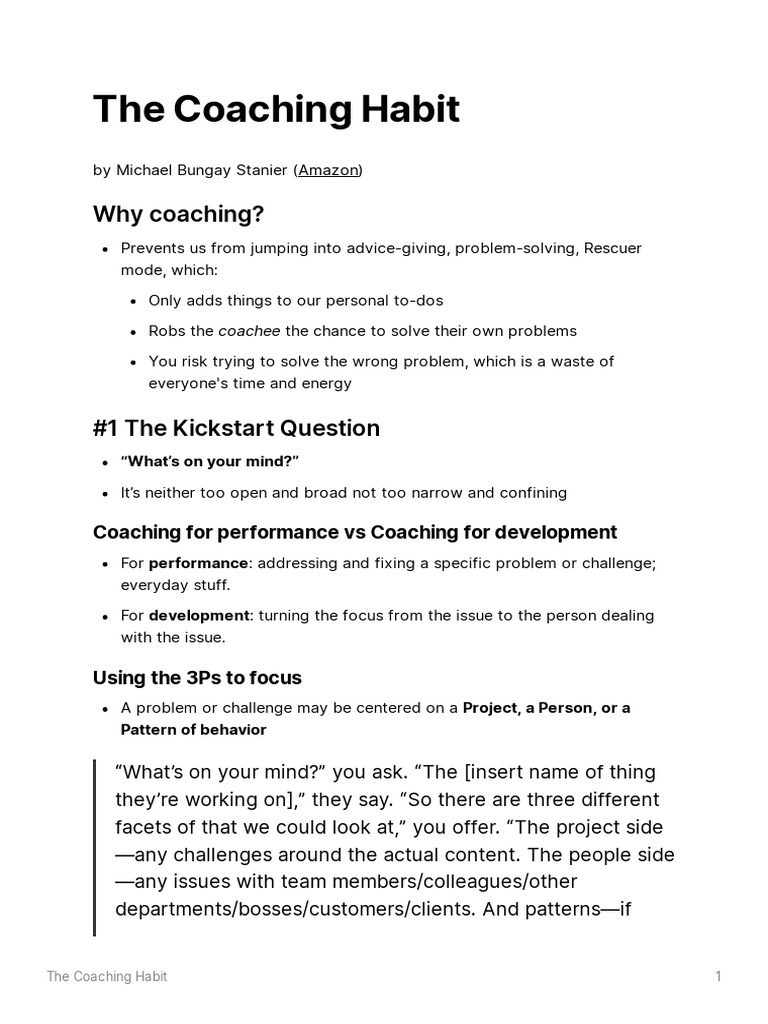Coaching has become an indispensable pillar in today’s fast-paced and complex work environments, and rightly so. In an era where adaptability and perpetual growth are tantamount to success, the art of coaching transcends mere instruction; it fosters transformation. Within this context, the framework offered in “The Coaching Habit” shines like a beacon, providing a roadmap not just for personal achievement but for cultivating a culture of exploration and collaboration. Let us delve into a pivotal aspect of this methodology—seven essential questions that can catalyze profound shifts in perspective.
At the heart of coaching lies inquiry. Effective questions can unearth insights that mere statements cannot. They invite individuals to navigate their own thoughts and motivations, propelling them toward their desired outcomes. Conversely, failed questions can stifle progress, leaving both coach and coachee adrift in ambiguity. Hence, mastering the art of questioning is paramount. The following seven questions guide you in this pursuit, encouraging critical thinking and promoting transformative dialogues within coaching sessions.
1. What’s on your Mind?
This deceptively simple opening question serves as a catalyst for dialogue. It provides the individual an opportunity to prioritize what matters most to them at that moment. By inviting them to articulate their thoughts, you are not just lending an ear; you are signaling that their concerns are valued. This question encourages authenticity and lays the groundwork for deeper exploration into issues that may be obstructing their progress.
2. And What Else?
Once the coachee has shared their initial thoughts, the follow-up question “And what else?” amplifies the conversation. This not only signals active listening but also prompts a more comprehensive examination of the topic at hand. Often, real treasures lie beneath the surface, waiting for someone to prod gently. This question pushes boundaries, leading to revelations that may have otherwise remained concealed.
3. What’s the Real Challenge Here for You?
In this complex tapestry of challenges, it is easy to get lost in symptoms rather than addressing root causes. This question steers the focus toward the underlying issues that may be hindering progress. By inviting the coachee to delineate their personal obstacles, you empower them to engage in self-reflection and analysis. This exploration can foster genuine problem-solving and clarity, illuminating the pathways toward resolution.
4. What Do You Want?
Understanding the desired outcome is crucial for any coaching process. This question is not just about laying out objectives but about exploring deeper desires and aspirations. It invites the individual to envision their ideal scenario. In becoming aware of their wants, coachees can align their actions with their intentions, bridging the gap between where they are and where they aim to be. Being explicit about desires facilitates accountability and can invigorate motivation.
5. How Can I Help?
Turning the focus back to the coach, this question fosters a collaborative atmosphere. It emphasizes the partnership dynamic inherent in coaching. By asking how you can assist, you validate their agency in navigating their journey while positioning yourself as a supportive ally. This question is particularly effective, as it encourages honest dialogue about expectations, facilitating a more productive and supportive relationship.
6. If You’re Saying Yes to This, What Are You Saying No To?
This question elucidates the concept of opportunity cost. In a world brimming with choices, every decision comes with its own set of trade-offs. By contemplating what they might be forsaking, coachees can make more informed, intentional choices. This question acts as a reality check, steering clear of overwhelm by refining focus on priorities. It fosters a nuanced understanding that every commitment demands discernment.
7. What Was Most Useful for You?
Engaging in retrospective analysis, this final question wraps up the conversation by encouraging reflection on the insights gained. By pinpointing what resonated most, individuals become more attuned to their learning processes and growth. This practice cultivates metacognition—the awareness of one’s own learning and thought processes—enabling coachees to synthesize their experiences and carry forward valuable lessons into future challenges.
These seven questions are not just mere prompts; they are instrumental in sculpting the coaching experience. The beauty of this framework lies in its adaptability— it can be utilized in formal coaching settings, team meetings, or even in casual conversations. Each question holds the potential to incite fresh perspectives, foster connections, and empower individuals to take charge of their journeys.
In the realm of coaching, the questions we ask can redefine the boundaries of personal and professional development. They illuminate insights previously cloaked in uncertainty, encouraging self-discovery and growth. Striking a balance between curiosity and straightforwardness, these inquiries move relationships beyond transactional exchanges and cultivate meaningful dialogue. They serve as stepping stones toward mastery and self-efficacy, enabling individuals not only to navigate challenges but to flourish amidst them.
As you wield these questions, remember their ultimate goal: to create an environment where discovery and innovation thrive. By inviting individuals to explore and articulate their thoughts, you amplify their capacity to envision possibilities and devise solutions. Transform your approach, fuel curiosity within your team or clientele, and watch as the coaching relationship evolves into a dynamic partnership grounded in trust and empowerment.
